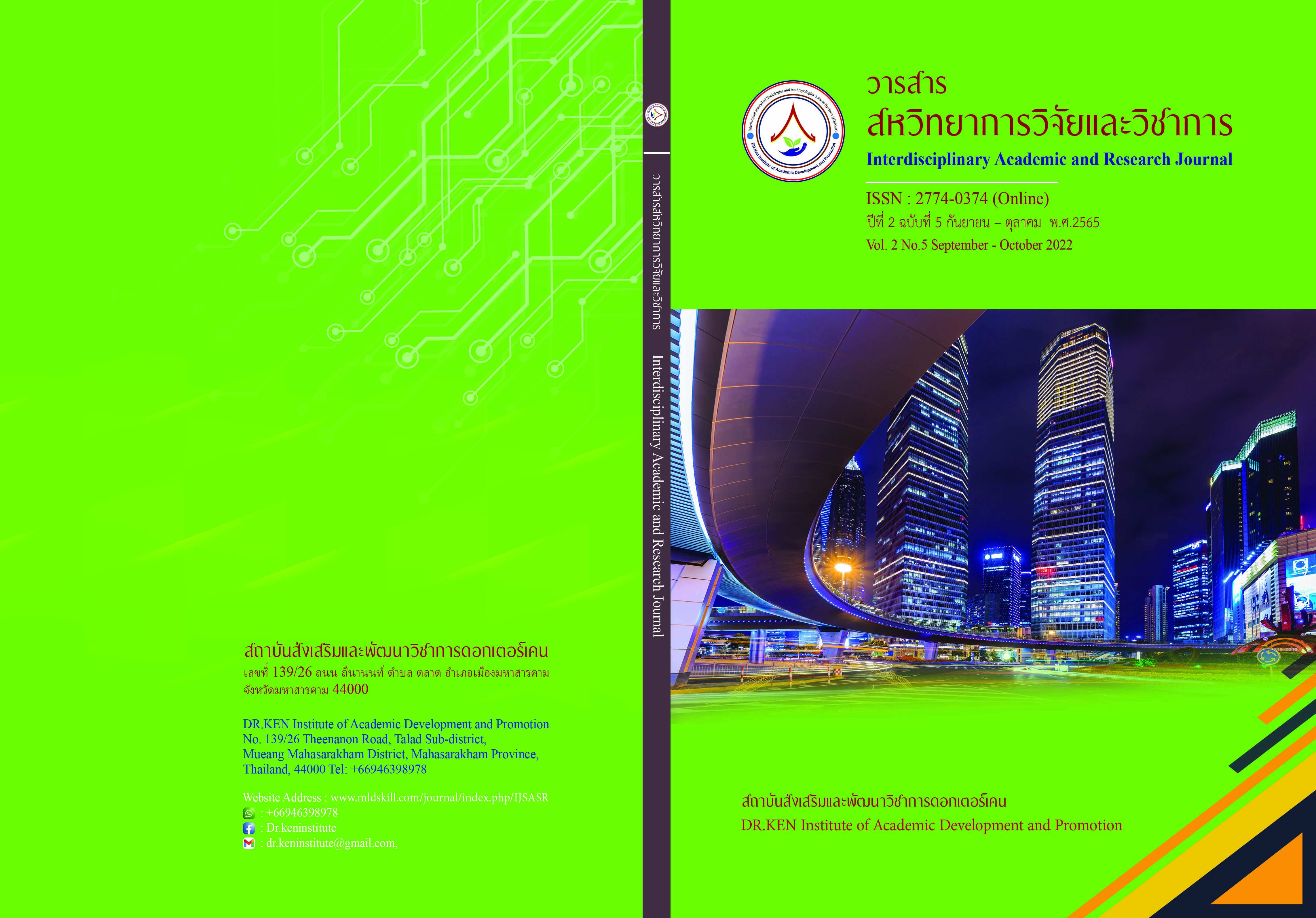Application of Wisdom of Ginger Farmers in Highlands to Promote Community Economy in Nam Nao District, Phetchabun Province
DOI:
https://doi.org/10.14456/iarj.2022.110Keywords:
Wisdom; , Ginger Planting; , Highland Farmers; , Community EconomyAbstract
Thailand is a country with the majority of the population engaged in agriculture and a land of crops, vegetables and fruits due to the variety of crops that change throughout the year. Ginger is one of the most important crops in Thailand and grows well in general areas, especially in the upland areas, where ginger is an important source of ginger production and trading in Thailand. Thus, the objectives of this study were 1) to study the background, wisdom and problems the farmers encountered in ginger cultivation in the highlands of Phetchabun Province, 2) to establish the guidelines for the application of commercial ginger cultivation by farmers in the highlands in order 3) to promote the community economy and to use the obtained guidelines in ginger cultivation in the highlands. This study was a mixed method research consisting of qualitative research and quasi-experimental research. The data collection was conducted through observations, interviews, focus group discussion and experiments. The results showed that 3 farmers have different background, the application of wisdom and problems encountered in ginger farming which include farmland selection, seed selection, soil preparation, cultivation method, irrigation and fertilization, disease and weed prevention, and harvest. These farmers have some similarities and differences in their cultivation methods. In establishing the guidelines for commercial ginger cultivation of farmers in the highlands, the analysis of the similarities and differences among 3 farmers lead to successful application of the commercial ginger cultivation. A farmer applied the obtained guidelines in his ginger cultivation in Nam Nao district and found that this method led successful cultivation in terms of average ginger quantity per rai and quality, with an average profit of 23,680 baht/rai. As for the promotion of community economy, the farmers still gain profit considering the current price of ginger because there are certain markets for their produce, but the price may fall in the future.
References
กรมการแพทย์แผนไทยและการแพทย์ทางเลือก. (2564). พืชสมุนไพรเศรษฐกิจสู่มาตรฐานการทำยา, นนทบุรี กองการแพทย์ทางเลือก กระทรวงสาธารณสุข
กรมควบคุมโรค. (2564). รายงานผลการทบทางเศรษฐกิจและสังคมจากการระบาดของโรคโควิด 19 ในระดับโลกและในประเทศไทย. นนทบุรี: สำนักงานพัฒนานโยบายสุขภาพระหว่างประเทศกระทรวงสาธารณสุข
กรมส่งเสริมการเกษตร. (2562). รายงานสถิติการเกษตรพืชอายุสั้น. กรุงเทพฯ กระทรวงเกษตรและสหกรณ์
กฤษฎา บุญชัย. (2559). ไร่หมุนเวียนสิทธิทางวัฒนธรรมเพื่อความเป็นธรรมทางนิเวศและสังคม,วารสารพัฒนาสังคม, 18 (ฉบับพิเศษ). 1-20
จิราภรณ์ ปาลี, สมบูรณ์คำเตจา และจุฬาลักษณ์ ลาเกิด. (2563). การใช้ประโยชน์พืชวงศ์ขิงตามภูมิปัญญาท้องถิ่น อำเภอเชียงแสน จังหวัดเชียงรายและการเพาะเลี้ยงเนื้อเยื่อเพื่อการอนุรักษ์. วารสารวิจัยรามคำแหง (วิทยาศาสตร์และเทคโนโลยี), 23(1), 27 -38
ทรงคุณ จันทจร. (2563). การวิจัยเชิงคุณภาพทางวัฒนธรรม . คณะมนุษยศาสตร์และสังคมศาสตร์ มหาวิทยาลัยราชภัฏมหาสารคาม.
มหาวิทยาลัยมหิดล. (2564). งานวิจัยมหาวิทยาลัยมหิดลเปรียบเทียบประสิทธิผลขิงยับยั้ง covid19. ฝ่ายข้อมูลมูลนิธิชีววิถีกรุงเทพฯ
Cartledge, Danicl M. (1995). Taming the Mountain : Haman Ecology, Indigenous knowledge, and sustainable resource management in the Doko Gamo society of Ethiopia. Ph.D. Dissertation Florida : University of Florida.
Downloads
Published
How to Cite
Issue
Section
License
Copyright (c) 2022 Thananun Sawetchottanakon, Rapeepun Sirisumpun, Rungson Singhalert

This work is licensed under a Creative Commons Attribution-NonCommercial-NoDerivatives 4.0 International License.
Copyright on any article in the Interdisciplinary Academic and Research Journal is retained by the author(s) under the under the Creative Commons Attribution-NonCommercial-NoDerivatives 4.0 International License. Permission to use text, content, images, etc. of publication. Any user to read, download, copy, distribute, print, search, or link to the full texts of articles, crawl them for indexing, pass them as data to software, or use them for any other lawful purpose. But do not use it for commercial use or with the intent to benefit any business.
















.png)


